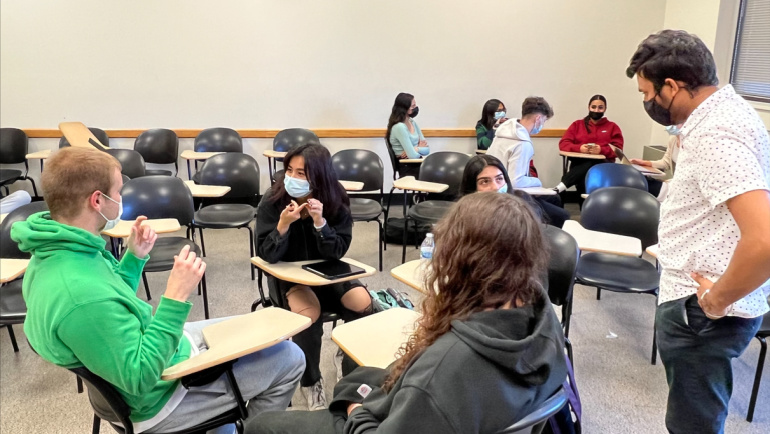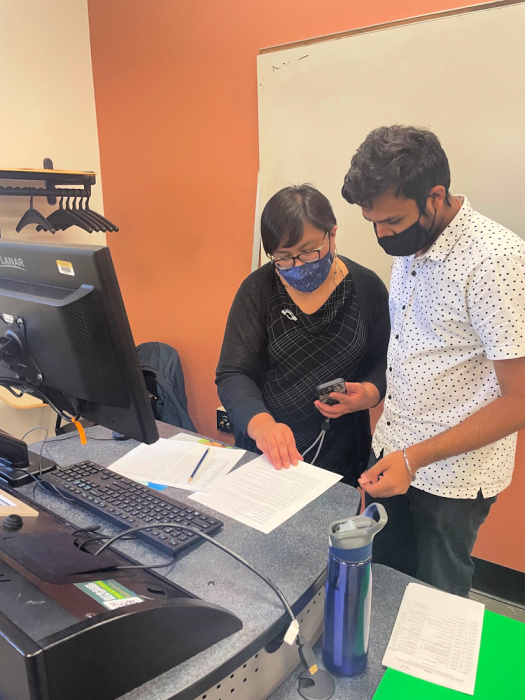
First-year students are getting to know campus, connecting with one another and exploring academic pathways together through Wayne State University’s new First-Year Interest Groups (FIG). New this fall, FIGs use block scheduling to create academic-based learning communities and simplify registration. There are currently 20 FIGs, with a total of 405 students, representing approximately 15% of the 2022-23 incoming class. FIGs are one of multiple first-year groups on campus designed to help incoming students connect and succeed, including the First Year Residential Experience (FYRE) residential community and more than 30 Learning Communities.
Shared courses, shared experiences
Students were invited to sign up for a FIG based on their interests and placement during First-Year Student Orientation. Noting that most first-year students take four or five classes in their first semester, Kelly Dormer, associate director of strategic academic initiatives, said that FIG helps take some of the guesswork out of registration by offering a pre-loaded schedule carefully curated for various academic interests.
“Sometimes, registration can be overwhelming for incoming students. It’s a lot of new information all at once. With FIG, we’ve made it two easy clicks,” she said. “FIGs help to eliminate some of the guesswork from that process and set a student up for success by creating cohorts of peers who will experience many of their first courses together. Our hope is that these students will build connections that last beyond orientation and their first semester.”
Each FIG includes between 10 and 35 students, is coordinated by an academic advisor, and includes a Wayne Experience course — such as First-Year Seminar (FYS) — in addition to general education and introductory courses. Block schedules including between two and six classes were designed by academic departments to prioritize in-demand courses while still allowing flexibility for students to schedule electives outside the FIG. A dedicated page in Canvas allows for interaction beyond the classroom and each FIG has a peer mentor to provide support from the student perspective.

2022 First-Year Interest Groups:
- Biological Sciences
- Business
- Chemistry
- Exploratory Liberal Arts
- Exploratory Fine Arts
- Music
- Pre-Engineering
- Pre-Med
- Pre-Nursing
- Psychology
- Public Health
- Sports Management
Simplifying registration and finding an academic home
In simplifying registration, FIGs were intended to ease scheduling and encourage early registration. Ninety-five percent of current FIG students are enrolled full time, with 42% enrolled in more than 15 credits. FIG students, 45% of whom are first-generation students, include those from other student groups and are encouraged to connect with other Learning Communities. In addition to FIG-specific activities, plans are in place to coordinate programming that brings together all 20 FIGs around registration, social events and financial literacy.
“We’re offering an intentional, curated experience centered around shared academic interests, with the goal of having enough FIGs so that we have an offering that appeals to every incoming student,” Dormer said. “To that end, we plan to offer FIGs in fall 2023 that aren’t major specific, but instead are interdisciplinary and focused on different themes like social justice, sustainability and all things Detroit.”
Kevin Papuga, an academic advisor in the Mike Ilitch School of Business and FIG coordinator, said pitching the idea of streamlined registration was easy.
“The ease of registration was huge for them,” he said. “Students knew they’d be set for fall. With this program, we’re helping to reduce some of that first-year anxiety and meeting the students where they’re at.”
Enhanced classroom experiences
A survey of current FIG students found that nearly 80% of respondents had interacted with classmates by the third week of the semester, with students noting that block scheduling made it easier for them to connect with one another and manage their time.
For faculty like Jaime Goodrich, professor of English and director of the Humanities Center, FIGs have helped foster learning by creating community.
“I'm only four weeks into the semester, and teaching students in a First-Year Interest Group has already been a rewarding experience. Because the students are taking multiple courses together, they have already gelled into a community. Not only are the FIG students more comfortable than usual sharing their thoughts in class, but they are also genuinely supportive of one another as they master new concepts,” said Goodrich. “By encouraging our students to develop communities that span more than one course, FIGs create an optimal environment for learning even as they help students navigate the transition to college.”
Desmond Mack, coordinator of the pre-nursing FIG and FYS instructor, said the program has helped students connect earlier in the semester.
“Walking into class on that first day, the students were already talking and exchanging information. There wasn’t the typical first day silence,” he said. “The students are already connected and working together before classes have even started.”
Looking ahead
Plans are in place to offer FIG next semester and expand the program to include a Transfer Wayne Interest Groups pilot program. Dormer said the program hopes to bring in more faculty and is working on a partnership with Housing and Residential Life.
To learn more about First-Year Interest Groups, visit wayne.edu/registrar/fig.
